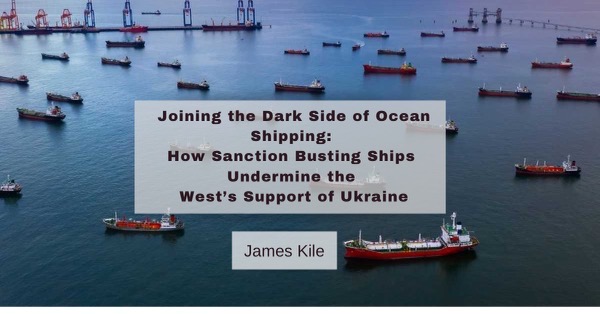
James Kile
The open ocean has long been a chess board in the struggle for nations to gain and maintain influence.[1] From piracy, war, and trade, the world’s oceans have often been a battleground of international political strategy.[2] The dark side of the ocean shipping ecosystem is one of many recent challenges faced by Western nations in their support for Ukraine. A fleet of “shadow” ships numbering 600 are avoiding sanction controls by turning transmitters off and falsifying documentation.[3] Estimates show that the dark fleet contains as much as 10% of the total tanker ships sailing internationally.[4] The increased demand in the dark fleet’s services due to Russia’s invasion of Ukraine has exacerbated the issue and forced the international community to take a hard look at reforms.[5]
In response to the invasion of Ukraine, Europe moved to wean itself off its growing dependence on Russian oil.[6] China and India quickly moved to make up the difference by dramatically increasing imports of Russian oil shortly after the war in Europe began.[7] Transporting sanctioned oil requires ships willing to take on the risk; this is where the opaque and elusive nature of the dark fleet comes into play. Senior CNN analyst Mathew Wright separates the shadow ships into two categories: first, the gray ships which are rookies to sanction busting, and second, the true dark ships that are veterans of oil smuggling from campaigns in venezuela, Iran, and North Korea.[8]
Sanction busting is not new, nor is it isolated to one or even a handful of countries.[9] In 2004 U.S. military personnel intercepted a North Korean-operated, Cambodian-flagged, ship carrying illegal SCUD missiles.[10] Earlier this year the Associated Press released photo evidence of an Iranian operated and Marshall Island flagged tanker making a mid ocean ship to ship transfer of crude oil in the Mexican Gulf.[11] These incidents help illustrate the variety of nations that use smuggling as a means to secure economic interests. In both incidents North Korea and Iran were able to hide their actions with the help of the Cambodian and Marshall Island shipping registries using what is called a “flag of convenience.” Flags of convenience allow shipping companies to operate vessels under the laws of the nation whose flag the ship sails under.[12] This gives smaller nations a chance to make quick cash in exchange for helping sanction busting ships avoid regulation and detection.[13] The phenomenon is especially obvious in the case of Mongolia. Despite being the world’s largest landlocked nation, it officially operates 3,000 ships in its registry and serves a host of “dubious” actors.[14] The United Nations Convention on the Law of the Sea requires that there exists a “genuine link” between a ship’s flag and a ship’s owner.[15] However, since there is no official international enforcement body to keep states in check, it is increasingly difficult to penalize violators.[16] As it currently stands, nearly 75% of the world’s fleet flies under a flag of convenience.[17]
The dark underbelly of ocean shipping presents several challenges to the international community. First, what can be done to ensure effective sanction against Russia? Next, what effects do aging and unregulated vessels have on the environment? Lastly, how can the international community strengthen its enforcement of legal norms on the open ocean? Future solutions will require greater international cooperation and empowerment of existing enforcement structures.
[1] R.R. CHURCHILL & A.V. LOWE, THE LAW OF THE SEA, MANCHESTER UNIV. PRESS 1–3 (3rd ed. 1999).
[2] Id.
[3] World Econ. F., What are ‘shadow fleets’ and how do they hinder efforts to help Ukraine?, Feb. 15, 2023 https://www.weforum.org/agenda/2023/02/shadow-fleet-hurting-efforts-to-defund-the-invasion-of-ukraine/.
[4] Lloyd’s List, Dark fleet: Out of mind, but not out of sight, Mar. 31, 2023, https://lloydslist.maritimeintelligence.informa.com/.
[5] Julia Horowitz, A mysterious fleet is helping Russia ship oil around the world. And it’s growing, CNN, Mar. 1, 2023, https://www.cnn.com/2023/03/01/business/russia-oil-shadow-fleet/index.html.
[6] Id.
[7] Id.
[8] Id.
[9] Elisabeth Braw, The Caspian Sea Is a Sanction-Busting Paradise, FOREIGN POLICY, Aug. 14, 2023, https://foreignpolicy.com/2023/08/14/russia-iran-caspian-sea-sanctions-busting-paradise/.
[10] Elisabeth Braw, Mongolia’s Paper Fleet Is Helping Russia Dodge Sanctions, Foreign Policy, June 1, 2023, https://foreignpolicy.com/2023/06/01/mongolia-shipping-industry-russia-sanctions/#cookie_message_anchor.
[11] Jon Gambrell, A tanker believed to hold sanctioned Iran oil starts offloading near Texas despite Tehran’s threats, Associated Press, Aug. 20, 2023, https://apnews.com/article/iran-us-tensions-suez-rajan-tanker-oil-3f257407678b844e5c71c39334866bb1.
[12] Braw, supra note 9.
[13] Id.
[14] Id.
[15] U.N. Convention on the Law of the Sea art. 91, Dec. 10, 1982, 1833 U.N.T.S 397.
[16] Braw, supra note 9.
[17] Id.
